In part one of this series I discussed the TrustRank algorithm and how it, or something like it, contributes to Vince, Google's so called "brand" update that took place in the UK at the beginning of July.
I'm going to use today's blog post to examine another idea gaining traction among the SEO community, namely that Google may associate particular sites, let's say www.directline.com, with generic search terms like "car insurance", based on the search demand for {brand} + {generic} search terms (in this case "direct line car insurance"). To my knowledge this was first posited publicly by Patrick Altoft in a post titled how search volume data may be used to determine brand authority. The gist of Patrick's post is summarised in this quote;
Though Patrick doesn't claim to have proven that there is a relationship between search demand and rankings, he does go on to show a number of cases that support the argument, and it's certainly an interesting hypothesis and one that warrants some thought.
Why might Google use search demand to help determine rankings?
Consider the benefits;
- Search demand is more difficult to fake than some traditional signals of quality. Anchor text, for example, can be artificially manipulated easily by acquiring many cheap links from, say, a link exchange network. In contrast it's not at all clear that artificially manipulating search demand is even possible to do, given the requirements to conduct hundreds of thousands or even millions of diverse and natural looking searches each month.
- Google lives and dies by the relevance of its search results. By aligning search results with user expectation Google appears more relevant, even if those search results aren't technically the "best" resource for a given query.
Why would this only affect big brands?
Undoubtedly brands have been most affected by the Vince update, so with any theory about the algorithm change it's important to ask why that change would affect brands more than other sites.
In the case of search demand the answer is obvious. What drives search demand for specific sites is brand visibility, both online in terms of online PR and community discussion, and offline with above the line advertising. By their very definition brands have more brand visibility than other sites.
Initial analysis
The following charts show a selection of the winners and losers from the Vince update, along with their relative search demand as given by Google Insights and the Google Keyword Tool. This is my no means an exhaustive analysis into the theory and at the time of writing we're still seeing a great deal of fluctuation in the rankings, so for now we're taking any conclusions from this data with a grain of salt.
Note that the full methodology and results of our Vince algorithm update analysis will be published in a forth coming white paper.
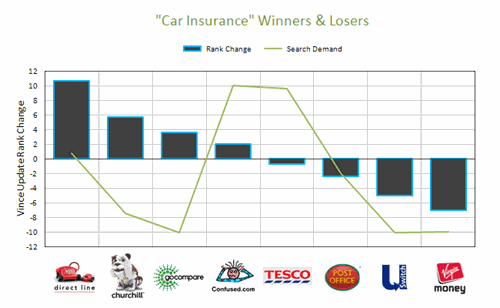
In car insurance the sites that have moved the least (Tesco and Confused.com) have the highest search demand, though the big mover - Direct Line - also scores well here.
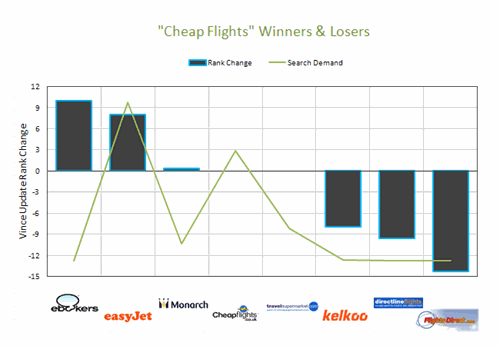
Ebookers is an anomaly, having improved by 9 places for the term "cheap flights" with little or no search demand. We'll ignore cheapflights.co.uk; since they already ranked in position 1 before the update they could not be expected to improve despite the high search demand for their brand (which of course matches the search term exactly). Worth noting that in flights aggregators seem to have particularly suffered.
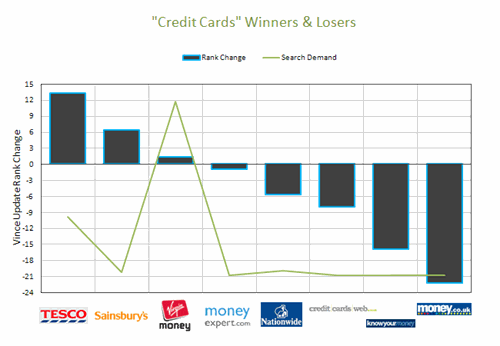
Virgin is both one of the hottest rising and top searches according to Google Insights, contributing to its high demand score, but has only improved moderately as a result of Vince. Tesco on the other hand has come from nowhere to position 3, and has the second highest search demand among analysed sites. As with flights, suppliers have generally gained positions at the expense of aggregators.
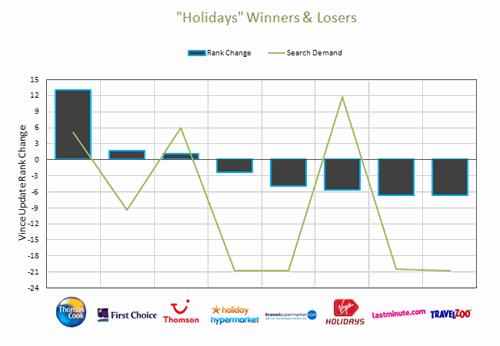
As with credit cards, Virgin seems to buck the trend for "holidays" as well, spoiling an otherwise reasonable correlation.
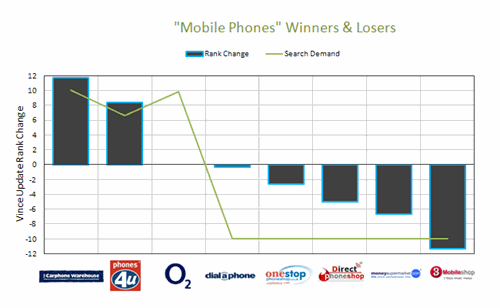
There is fairly good correlation for mobile phones (O2 excused, again since they already ranked in position 1 before the update).
All together, the data we've analysed so far shows a 0.37 correlation efficient between ranking fluctuations as a result of the Vince update and search demand, which though mildly positive is by no means conclusive (if you're unfamiliar with correlation efficients, they work on a scale of -1 to 1, with 0 being no correlation, -1 being a completely negative correlation, and 1 being a perfect correlation).
(Tentative) conclusion
Given the evidence so far I'm hesitant to suggest that search demand is definitely a factor in the brand update. The above research suggests that there is no significant correlation between search demand for specific brands and the performance of those brands post-Vince. Even if there were correlation it's important to always bare in mind that correlation doesn't necessarily equal causation.
On the other hand the hypothetical arguments for why Google would consider search volume in its algorithm are persuasive. Furthermore increasing search demand for your brand is clearly highly beneficial anyway, since your brand is a keyword space that is easy to dominate. I've a suspicion that this may stay an "SEO best practice" rather than a quantifiable recommendation, but watch this space for more research.


